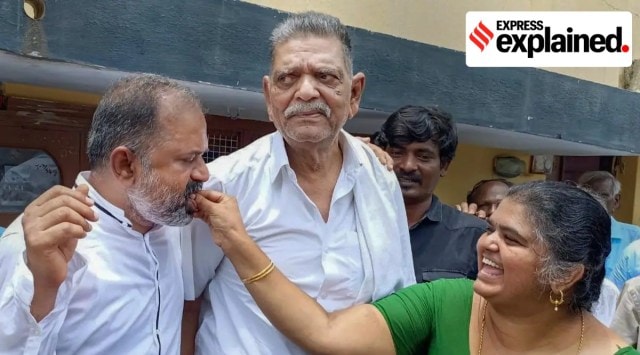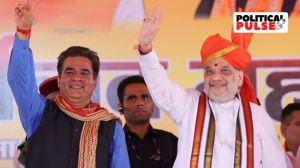- India
- International
Explained: AG Perarivalan’s road to freedom
Three decades after his arrest in the Rajiv Gandhi assassination case, A G Perarivalan has been set free by the Supreme Court. A look at the charges he faced, the commutation of his death sentence, and his legal battle.
 Perarivalan with his father and sister in Jolarpet, Tamil Nadu on Wednesday. (PTI Photo)
Perarivalan with his father and sister in Jolarpet, Tamil Nadu on Wednesday. (PTI Photo)A G Perarivalan alias Arivu, 50, was only 19 when he was arrested on June 11, 1991. He was accused of having bought two 9-volt ‘Golden Power’ battery cells for Sivarasan, the LTTE man who masterminded the conspiracy to assassinate Rajiv Gandhi. The batteries were used in the bomb that killed the former Prime Minister on May 21 that year.
Perarivalan was “set at liberty forthwith” on Wednesday by the Supreme Court, which used its extraordinary powers “for doing complete justice” under Article 142 of the Constitution. Perarivalan’s release marks the culmination of the legal battle he waged from his cells in Tamil Nadu’s Vellore and Puzhal Central prisons over three decades.
Perarivalan had filed a plea seeking release in accordance with the recommendation made by the Tamil Nadu government in September 2018. The Governor sat on the recommendation for two-and-a-half years before forwarding it to President Ram Nath Kovind in February 2021, and the delay continued.
On May 11, the SC completed the hearing and reserved its orders. On Wednesday, the court ruled that it is “well-settled that the advice of the State Cabinet is binding on the Governor in the exercise of his powers (to grant pardons, reprieves, respites or remissions) under Article 161 of the Constitution”, and that the “non-exercise of the power under Article 161 or inexplicable delay in exercise of such power not attributable to the prisoner is subject to judicial review”. It also said “the reference of the recommendation of the Tamil Nadu Cabinet by the Governor to the President of India two and a half years after such recommendation had been made is without any constitutional backing and is inimical to the scheme of our Constitution”.
Long legal battle
Perarivalan was sentenced to death by a TADA court in 1998, and the sentence was upheld by the Supreme Court in 1999. The sentence was commuted to life imprisonment by the Supreme Court on February 18, 2014, along with the death sentences awarded to other convicts in the case, Murugan and Santhan.

The case in the SC was part of a 2015 remission plea submitted by Perarivalan to the Tamil Nadu Governor, seeking release under Article 161 of the Constitution. He moved the Supreme Court after receiving no response.
He was granted parole for the first time in August 2017, to meet his ailing father, a Tamil poet and a retired school teacher.
The parole order said that he had completed the sentences awarded to him for various offences for which he had been convicted, and that he was now serving time in prison only under IPC Section 302 (punishment for murder). The order said it was open to the appropriate authority (the state government) to consider the case of the convict.
Hearing his plea on the delay in deciding his plea for remission, the SC had said in September 2018 that the Governor had the right to decide on his petition. Within days, the Tamil Nadu Cabinet, headed by then Chief Minister Edappadi K Palaniswami, had recommended the release of all seven convicts. But Raj Bhavan chose to sit on it.
The Governor faced strong remarks from the Madras High Court in July 2020. The HC reminded him that no time limit had been prescribed for the constitutional authority (Governor) to decide on such issues only “because of the faith and trust attached to the constitutional post”. The court added that “…If such authority fails to take a decision in a reasonable time, then the court will be constrained to interfere.”
In January 2021, the SC too expressed displeasure on the delay on the part of the Governor, and warned that the court may be forced to take a decision. The government counsel promised a decision would not be delayed further. But taking everyone by surprise, the Governor’s office forwarded the file to Rashtrapati Bhavan in February 2021.
Senior jurists described the Governor’s action as “illegal”, and the SC raised questions on the move in multiple hearings after that. But the matter continued to lie with Rashtrapati Bhavan.
In the meantime, the state government granted parole to Perarivalan on May 19, 2021. His parole was subsequently extended on “health grounds”. The Supreme Court granted him bail on March 9, 2022.
Charges against him
“…Moreover, I bought two 9 volt battery cells (Golden Power) and gave them to Sivarasan. He used only these to make the bomb explode,” said Perarivalan’s confession statement taken under Section 15(1) of TADA. While the TADA court used the confession to establish his link with the assassins and his knowledge and role in the assassination, in multiple pleas before the Governor, President and the courts since his conviction in 1999, Perarivalan consistently claimed innocence.
Giving legitimacy to Perarivalan’s claims, an IPS officer named V Thiagarajan revealed in 2013 that he had, in fact, altered the statement that was taken from Perarivalan while he was in custody. Thiagarajan revealed that Perarivalan had admitted to having purchased the batteries, but he did not know the purpose for which they would be used.
“As an investigator, it put me in a dilemma. It wouldn’t have qualified as a confession statement without his admission of being part of the conspiracy. There I omitted a part of his statement and added my interpretation,” Thiagarajan said.
Four witnesses were examined by the TADA court regarding the battery to corroborate Perarivalan’s confession. Three of these witnesses were forensic experts who gave expert opinions on the battery and the bomb; the fourth was an employee of a shop in Chennai that claimed to have sold the battery.
In a 2017 interview with The Indian Express, Justice K T Thomas, who headed the SC Bench that awarded the final order in the Rajiv Gandhi assassination case, said Perarivalan’s case had brought to the fore another aspect that generated intense debate — using the confession of one accused against another. “Under the conventional Evidence Act, a confession can be used only as a corroborative piece of evidence. But the two other judges on my Bench did not agree, they insisted that we should use it as substantive evidence. To prevent the laying of such a wrong law, I called them to my home where we had several rounds of debates in which I tried to convince them. But the majority view in the judgment considered the confession statement as substantive evidence as it was under TADA (Terrorist and Disruptive Activities (Prevention) Act). Later, many senior jurists called me to say that the majority order laid a wrong law in the case,” he said.
Support for Perarivalan
Among the factors that sustained Perarivalan’s long battle was the determination and commitment of his mother, Arputham Ammal, who emerged as the face of an anti-death penalty movement, and the sympathy and empathy that he received from people from all walks of life.
“His soul is precious, his values noble, his jail life has not made him a criminal,” wrote the former SC judge, the late Justice V R Krishna Iyer, in 2006. He was in constant touch with Perarivalan until his death.
Newsletter | Click to get the day’s best explainers in your inbox
Justice Thomas, who had raised the question of ‘double jeopardy’ in 2013 in the case, which led to the SC order commuting the death sentences of three convicts in 2014, had pleaded with Sonia Gandhi to show magnanimity, and called the Governor’s decision to pass the buck to the President “unheard and unconstitutional”.
He cited the central government’s decision in 1964 to set free Gopal Godse, brother of Nathuram Godse, who was charged with conspiracy in the Mahatma Gandhi assassination case after 14 years of imprisonment.
More Explained
EXPRESS OPINION
Apr 26: Latest News
- 01
- 02
- 03
- 04
- 05









































